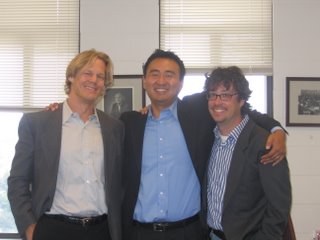as i was walkin' in memphis last week, minnesota vikings wide receiver koren robinson was apparently careening up highway 169 to the team's mankato training camp. his speed was estimated as 120 miles per hour and he blew a .09 on the breathalyzer when the law finally caught up with him. the
police report suggests that mr. robinson outran the locals in his bmw 7-series. since they knew he just
had to be a viking, though, they phoned ahead for friendly officers from three other jurisdictions to greet the fleet receiver upon his arrival in mankato. on this night, he was running fast, drunk, and out of control into
at least triple coverage.
mr. robinson's
criminal complaint charges him with one count of felony fleeing police, two counts of fourth-degree driving while impaired, and one count each of reckless driving, careless driving, and driving with a suspended license. all this has led to much hand-wringing and speculation about why a tipsy pro football player with a $12.7 million contract on the table would put so much at risk. i don't see any big mystery here that a simple
beccarian choice model couldn't explain.
i'm usually quick to
wag a finger at the pampered athlete's sense of entitlement, but this one actually makes sense to me as a criminologist. relapse is all too common for those with real substance use issues, so it is pretty easy to understand why he took a drink or three. this is a man with such a serious recent habit that he showed up with
booze on his breath to serve a one-day gift sentence last year in seattle.
why did mr. robinson speed through st. peter? he was racing to make an 11 pm curfew implemented by his
major dad-like new coach, brad childress. why did mr. robinson run? once he saw those red lights a-flashing, he knew he'd get at least a year's suspension as a repeat violator of the league's substance abuse policy, leaving some large money on the table. he was also at serious risk of becoming owner zygi wilf's sacrificial scapegoat, as the latter waged a public relations battle to obtain a new stadium at taxpayer expense. plus, if he's anything like me, he worried a lot about screwing up in public after all the feel-good stories had been written, letting down those friends who had gone out on a limb for him.
to be sure, mr. robinson is responsible for making all five of his terrible decisions on tuesday night:
1. drink
2. bust curfew
3. drive
4. speed
5. flee
that said, i'll make the indefensible assertion that the punishments are partly responsible for the crimes. mr. robinson's choice set was socially determined by increasingly strict rules and laws governing drinking and driving, as well as his own prior choices and behavior. i'd therefore argue that at least the last
four decisions were partially influenced by the severity of the sanctions attached to the preceding bad decision. that is, the severity of a curfew violation likely had
something to do with his speed that night; the severity of being sanctioned for drunk driving likely had
something to do with his decision to flee.
more indefensibly (less defensibly?), i might even argue that a zero tolerance, get-tough set of rules increased the threat to public safety on tuesday (recognizing, of course, that such rules might also have successfully deterred dozens of other wild-eyed vikings from taking to the road that night). to take a far more serious example, there is some evidence that twenty-five year mandatories for drug crimes may have had
something to do with the death of innocent witnesses in several cases in recent years. perhaps surprisingly, big-time dealers can be quite risk-averse.
drunk driving is pretty serious too, of course. nevertheless, as "recovering drunk" uberwriter
patrick reusse suggests, mr. robinson's "
official .09 blood alcohol reading made him easily the least drunk among the dozens of vikings arrested on similar charges." any longstanding vikes fan would concede mr. reusse's point that a .09 would have qualified mr. robinson for
designated driver status back in the franchise's tommy kramer/keith millard dui era. and those dudes
rarely got
tickets, much less felony charges.
yes, mr. robinson screwed up in a major way by putting other citizens and officers at risk on tuesday. before we ramp up any other formal and informal sanctions, however, we'd do well to remember that harsh punishments can sometimes make things worse. put another way, would
you consider fleeing the police if you knew that a citation would effectively end your career?
 on august 18, darren wheelock successfully defended his diss: Jury of One's 'Peers:' Felon Jury Exclusion, Racial Threat, and Racial Inequality in United States Criminal Courts. that's darren in the afterglow of his defense, flanked by me and co-advisor doug "stephanopoulos" hartmann.
on august 18, darren wheelock successfully defended his diss: Jury of One's 'Peers:' Felon Jury Exclusion, Racial Threat, and Racial Inequality in United States Criminal Courts. that's darren in the afterglow of his defense, flanked by me and co-advisor doug "stephanopoulos" hartmann.



 how much do you think one day of your life is worth? no, really. if you had to give up one day, what would be your price? i'll admit to occasionally having days that i would pay to have someone take for me, but in general, it's hard to put a price on one's life.
how much do you think one day of your life is worth? no, really. if you had to give up one day, what would be your price? i'll admit to occasionally having days that i would pay to have someone take for me, but in general, it's hard to put a price on one's life. 

